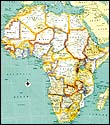
Embracing Tolerance

|
Papal Visits Focus
World Attention
on Democracy,
Human Rights
By Tal Kapelner and Thomas G. Whittle

hen Bill Clinton's plane touched down in Accra, Ghana, this spring, it marked the first time in two decades that a United States president had arrived to tour sub-Saharan Africa. One of the Chief Executive's first acts was to praise Ghanaian President Jerry Rawlings before an enthusiastic audience of 500,000 "for his leadership for democracy."
His visit took him to six nations — in addition to Ghana, there was Uganda, Rwanda, South Africa, Botswana and Senegal — with emphasis on the region's positive changes and the United States' awareness of its mounting influence in world affairs.
The sweep focused global attention on the growing promise of democracy and human rights. Much has happened there since the 1978 trip by then President Jimmy Carter, including the ousting of Ugandan dictator Idi Amin in 1979, the independence of Zimbabwe in 1980, the end of all remaining apartheid laws in South Africa in 1991 and the peaceful election of Nelson Mandela — a political prisoner for 18 harsh years — as president of that country in 1994.
Speaking before the Parliament of South Africa — a body in which the majority of legislators, until recent years, were not permitted to vote — Clinton praised that nation and its leader. Drawing from words on the tomb of John Dube, founder of the African National Congress, he said, "Mr. President, for millions upon millions of Americans, South Africa's story is embodied by your heroic sacrifice and your breathtaking walk 'out of the darkness and into the glorious light.'"

|
During the tour — calculated as three times longer than all trips to Africa by previous U.S. presidents combined — the message was one of freedom and individual rights. It was a theme that reverberated wherever he went, one that has grown in strength as democracy spreads and those who have the liberty to speak out take note where freedom lies under heel.
Building Blocks
Although certain African nations may be regarded as underdeveloped or "Third World," from a human rights perspective, South Africa and others have certainly joined the modern community of world nations — after the extensive cooperative efforts of foreign governments, human rights bodies and private citizens (see "Turning The Tide"). After all, the hallmark of an evolved nation is the adoption and practice of meaningful human rights standards. "A respect for human rights is a crucial index of whether or not that nation is representative of a civilized society," says Washington, D.C., human rights attorney Bill Walsh. "It is actually a far more telling than technology or economic factors," he added, citing the simple cultures of the South Pacific, such as Tonga and the Marshall Islands, as examples of nations which treat human life with dignity — and thus are rarely labeled "backward."
The presidential tour served to spotlight the many positive changes that have occurred in Africa. And while significant progress has been made, several African nations remain topics of discussion among activists; most notable among them is Nigeria, for its human rights record ranks as one of the most wretched in the region.
Despite an announced timetable from the country's ruler, General Sani Abacha, for transition to multiparty rule, to date there has been little progress toward democracy. The March 15, 1997, elections were, in the words of the U.S. ambassador, "deeply flawed." In April 1997, the government issued Decree Number 7, which allows for the removal at will of any elected official by the head of state. Other elections were postponed but are now scheduled for August 1998.
The winner of the 1993 presidential election, Chief Moshood K. Abiola, remains in detention for "treason" after declaring he had won, with the election results annulled. In November 1995, opposition leader Ken Saro-Wiwa and eight others were hanged. Despite strong international protests, security forces reportedly continue to murder, torture, harass human rights and pro-democracy groups, and sexually abuse female suspects and prisoners. Prison conditions remain life-threatening while government tribunals operating outside the constitutional court system undermine the judicial process. Restrictions on freedoms of speech, press, assembly and association continue.
Pope John Paul II, who concluded a stay in Nigeria the same day President Clinton arrived in Ghana, stressed the need for free elections and human rights in his public appearances. "The dignity of every human being, his inalienable rights, the inviolability of life, freedom and justice, the sense of solidarity and the rejection of discrimination — these must be the building blocks of a new and better Nigeria," he stated. Responsively, General Abacha promised to consider a Vatican request to release roughly 60 prisoners, including prominent dissidents, pro-democracy activists and journalists.
Nations at War
Another nation where human rights have remained in danger is the Congo — despite former President Mobutu's departure in May 1997 and his subsequent death.
Tribesmen in the Great Lakes region of Africa — specifically in Rwanda, Burundi and eastern portions of the Congo — have organized alliances that include openly genocidal factions. Security-conscious governments in the area have shared arms and intelligence and serious human rights abuses exist on all sides.
Countries with recent or current wars, in Africa or elsewhere, present a unique set of circumstances from the perspective of human rights. There is never a "humane" war, no matter the circumstances. What has been different about some conflicts, however, is that they took on genocidal dimensions.
The alarming brutality of the massacres and sexual violence against women in Algeria, for example, commanded the world's attention. At the end of 1997, as many as 1,000 civilians were being killed each month. Civil war as well as slavery and forced conscription of children continued in the Sudan. The government there continued to use murder, "disappearances," torture and harassment of suspected opponents to stay in power.
Promoting Dialogue
Religious freedom — also expressed as freedom of conscience or freedom of belief — is inseparable from any discussion of human rights. And in Algeria, the Sudan and elsewhere, for example, violence has been directed against minority religious groups.
In examining religious liberty worldwide, the Secretary of State's Advisory Committee on Religious Freedom Abroad stated in an interim report released January 23, 1998, "Throughout the world aggressive acts of religious intolerance and persecution still occur ... [but] despite these difficulties, religious leaders and groups are playing an increasingly significant role in preventing and resolving conflicts, reconciling antagonistic groups ... and promoting human rights." (See "Advisory Committee Cites 'Harassment, Intimidation and Violence,'" page 22.)
The Advisory Committee's interim report noted as an example of leadership in the religious arena the June 1997 creation of a permanent Inter-Religious Council in Bosnia-Herzegovina by the country's leaders of the Muslim, Roman Catholic, Serbian Orthodox and Jewish communities. The leaders of these ethnic and religious groups issued a joint statement recognizing their common values and that both religious considerations as well as common decency demanded that each person respect the basic human rights of others, and for all who have erred to take responsibility for their actions.
Hope for an end to persecution and violence springs also from new forums where grievances can be aired and problems discussed. The Appeal of Conscience Foundation has hosted meetings for leaders of different religions to address conflicts and human rights crises in many parts of the world. The foundation is also mentioned in the Secretary of State's interim report to the President as having promoted dialogue between religious communities and government through conferences, and as bringing religious leaders to speak about religious freedom issues at training sessions for U.S. government foreign service officers.
And offenders are increasingly in the spotlight. "Clearly, the central conflict in the world today is not between the adherents of one religion or culture and another," said Secretary of State Madeleine Albright. "Rather it is between those of all cultures and faiths who believe in law, want peace and embrace tolerance and those driven, whether by ambition, desperation or hate to commit acts of aggression and terror."

| ||
| An estimated 100 million DM is spent annually in Germany to fund attacks on minority groups in the media and through the government. Political parties have disseminated booklets that portray religious minorities as ‘insects” to be exterminated and specially packaged condoms for the stated purpose of preventing the conception of “new Scientologists” while letters, bearing the Nazi eagle, swastika and “SS” logo, have threatened anonymously. |
Out of Step
In contrast to areas where progress has been made, in South Africa and elsewhere, concern continues regarding one of the supposedly democratic Western states, one where basic freedoms and human rights have been guaranteed by law for more than half a century: Germany.
Treatment of minorities in Germany — religious and ethnic — has been a continuing problem as top officials there have rejected tolerance and equality, sanctioning outrageous human rights violations. In recent years, conditions for minorities have worsened sharply, particularly following reunification, with Africans beaten to death in the streets, Turkish and Vietnamese homes firebombed, Jewish synagogues burned.

The German government — a supposedly enlightened nation — has been repeatedly labeled a human rights violator by numerous human rights watchdogs and organizations, most notably including the U.S. State Department, the United Nations Human Rights Committee, the Rutherford Institute, Human Rights Watch/Helsinki and the Organization for Security and Cooperation in Europe.
This year's State Department Human Rights report contained that agency's most stinging and extensive reproach of Germany since the Second World War. (See "German 'Harassment' Condemned by State Department," page 20). It is the fifth consecutive year that the treatment of Scientologists was expressly criticized. Yet the situation faced by Scientologists remains a profoundly disturbing one. Teachers, students, executives, athletes, artisans — indeed, people in almost any walk of life in Germany — know that they risk losing their job, their business or their rights solely because of their religious beliefs, not because of any act of wrongdoing. Hundreds already have.
Political parties have disseminated booklets which portray religious minorities as "insects" to be exterminated and specially packaged condoms for the stated purpose of preventing the conception of "new Scientologists." Letters, bearing the Nazi eagle, swastika and "SS" logo, have been sent anonymously warning that "Your Association is under observation by the SS; You are requested to cease your activities and retreat overseas!"
And Scientologists are not alone. An estimated 100 million DM are spent annually to fund attacks on minority groups. That money supports, among other things, a vast network of "anti-sect commissioners" — government officials paid with state funds and select priests and pastors who are their church counterparts. These officials forward government propaganda attacks on those singled out for ostracism, which have included Muslims, Christians and Hindus.
Even from the perspective of some major players in German media and academia, the anti-minorities campaign has gone well beyond the pale. In May, six leading scholars, including a former German federal minister, denounced the government-sanctioned hysteria in a nationally published open letter. And in June, the newsweekly Der Spiegel strongly criticized a government-sponsored commission to "investigate" religious minorities for manifesting the very same dangerous and anti-democratic traits they claimed were present in "so-called sects and psychological groups," noting that more than 2-3 million DM had been expended to no meaningful result.
Censure from human rights watchdogs has also escalated. In March, after an 11-day on-site investigation into religious discrimination in Germany — during which he interviewed senior government officials as well as representatives of non-governmental organizations, minority faiths and other groups — the United Nations Special Rapporteur on Religious Intolerance recommended that "the State, beyond day-to-day management, must implement a strategy to prevent intolerance in the field of religion and belief."
Special Rapporteur Abdelfattah Amor reported serious problems of discrimination against a range of religious minorities including Muslims, Mormons, Jehovah's Witnesses, Baha'is, the Unification Church, Hare Krishnas and the Bagwans. Even those who said they do not experience direct persecution from the government said they suffer since "there is a climate of mistrust towards all religious minorities," said Amor.
But in spite of such embarrassing admonitions, that climate of mistrust has, in some respects, grown even more oppressive and brazen. In a very telling example of how far certain German officials are willing to go in their pursuit of persecution, an agent of the German Office for the Protection of the Constitution was arrested this spring in Basel, Switzerland, on charges of illegal espionage. Subsequent disclosures from Swiss authorities revealed that the agent was working undercover, in violation of international treaties and law, seeking to acquire "information" on Scientologists in that country. The agent stands trial in late 1998.
Naked discrimination and persecution in Germany contrast with progress toward equal rights, freedom and justice in other nations that have declared themselves democracies, showing how out of step German leaders are — violating the growing consensus that harassment of minorities, persecution of ethnic groups, and curbs against political opposition and speech are simply intolerable.
Or, as Ghanaian President Jerry Rawlings told the crowd in Accra before introducing President Clinton, "Only by allowing the individual to flourish can our communities also flourish."

